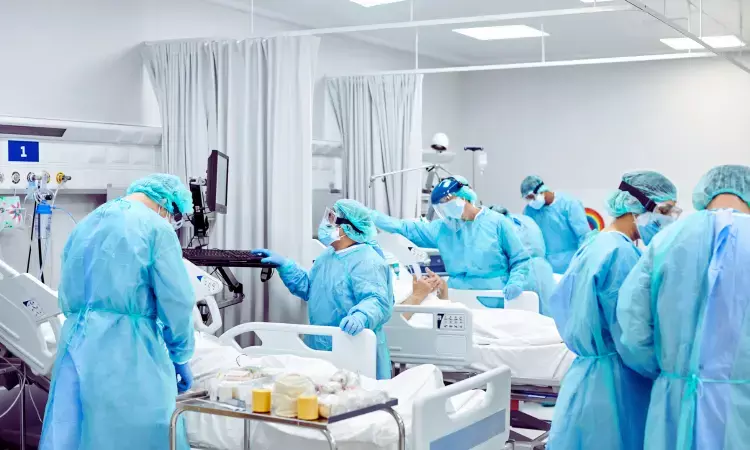- Home
- Medical news & Guidelines
- Anesthesiology
- Cardiology and CTVS
- Critical Care
- Dentistry
- Dermatology
- Diabetes and Endocrinology
- ENT
- Gastroenterology
- Medicine
- Nephrology
- Neurology
- Obstretics-Gynaecology
- Oncology
- Ophthalmology
- Orthopaedics
- Pediatrics-Neonatology
- Psychiatry
- Pulmonology
- Radiology
- Surgery
- Urology
- Laboratory Medicine
- Diet
- Nursing
- Paramedical
- Physiotherapy
- Health news
- Fact Check
- Bone Health Fact Check
- Brain Health Fact Check
- Cancer Related Fact Check
- Child Care Fact Check
- Dental and oral health fact check
- Diabetes and metabolic health fact check
- Diet and Nutrition Fact Check
- Eye and ENT Care Fact Check
- Fitness fact check
- Gut health fact check
- Heart health fact check
- Kidney health fact check
- Medical education fact check
- Men's health fact check
- Respiratory fact check
- Skin and hair care fact check
- Vaccine and Immunization fact check
- Women's health fact check
- AYUSH
- State News
- Andaman and Nicobar Islands
- Andhra Pradesh
- Arunachal Pradesh
- Assam
- Bihar
- Chandigarh
- Chattisgarh
- Dadra and Nagar Haveli
- Daman and Diu
- Delhi
- Goa
- Gujarat
- Haryana
- Himachal Pradesh
- Jammu & Kashmir
- Jharkhand
- Karnataka
- Kerala
- Ladakh
- Lakshadweep
- Madhya Pradesh
- Maharashtra
- Manipur
- Meghalaya
- Mizoram
- Nagaland
- Odisha
- Puducherry
- Punjab
- Rajasthan
- Sikkim
- Tamil Nadu
- Telangana
- Tripura
- Uttar Pradesh
- Uttrakhand
- West Bengal
- Medical Education
- Industry
G6PD Deficiency Increases the Risk of Severe COVID-19 in Black and White Male Veterans: JAMA Study

USA: A new study published in JAMA Network Open has revealed that individuals with glucose-6-phosphate dehydrogenase (G6PD) deficiency are at an increased risk of developing severe COVID-19.
G6PD deficiency is a genetic condition that affects the body's ability to produce the G6PD enzyme, which helps to protect red blood cells from damage.
The purpose of the study is to see if the presence of G6PD deficiency in veterans with SARS-CoV-2 infection is associated with an increased risk of developing severe COVID-19 compared to veterans who do not have G6PD deficiency. The analysis also explores whether this association differs by age, sex, and race while considering common comorbidities.
The retrospective cohort study, conducted by the US Veterans Health Administration, looked at 24,700 veterans with G6PD enzyme testing before January 1, 2020, and found that 4811 tested positive for SARS-CoV-2 from February 15th, 2020, to January 1st, 2021.
The study found the following key clinical takeaways:
- The study discovered that Black male veterans under the age of 65 and White male veterans 65 and older with G6PD deficiency were at a higher risk of developing severe COVID-19 than veterans without G6PD deficiency.
- Black male veterans less than 65 years old with G6PD deficiency had a 1.5-fold increased likelihood of developing severe outcomes.
- White male veterans aged 65 years or older with G6PD deficiency had a 3.6-fold increased likelihood of developing severe outcomes.
Dr. Sarah Elsea, the study’s lead author added, “The study's findings have important implications on public health and for healthcare professionals treating COVID-19 patients. The researchers propose that G6PD deficiency be considered as part of clinical strategies to reduce severe outcomes in people infected with SARS-CoV-2.”
This research is an important step in understanding the underlying biological risk factors for severe COVID-19 and highlights the need for tailored treatments for different populations. With COVID-19 still a major health concern worldwide, it is crucial that researchers continue to investigate and identify risk factors to improve patient outcomes.
Reference:
Elsea SH, Razjouyan J, Lee KM, Lynch JA, Martini S, Pandit LM. Association of Glucose-6-Phosphate Dehydrogenase Deficiency With Outcomes in US Veterans With COVID-19. JAMA Netw Open. 2023;6(3):e235626. doi:10.1001/jamanetworkopen.2023.5626
Dr. Mahalakshmi Sivashankaran joined Medical Dialogues as an Intern in 2023. She is a BDS graduate from Manipal College of Dental Sciences, Mangalore Batch 2022, and worked as a Junior Resident at VMMC & Safdarjung Hospital at the Department of Dental Surgery till January 2023. She has completed a Diploma in Executive Healthcare management from the Loyola Institute of Business Administration, developing skills in Healthcare Management and Administration. She covers several medical specialties including Dental, ENT, Diagnostics, Pharmacology, Neurology, and Cardiology.
Dr Kamal Kant Kohli-MBBS, DTCD- a chest specialist with more than 30 years of practice and a flair for writing clinical articles, Dr Kamal Kant Kohli joined Medical Dialogues as a Chief Editor of Medical News. Besides writing articles, as an editor, he proofreads and verifies all the medical content published on Medical Dialogues including those coming from journals, studies,medical conferences,guidelines etc. Email: drkohli@medicaldialogues.in. Contact no. 011-43720751


